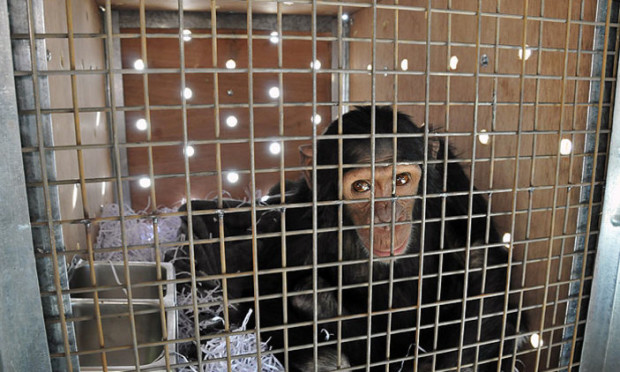
Four-year-old chimpanzee Manno, rescued from a zoo in Duhok after being trafficked from Syria, playing in his transport crate at Erbil International airport before his flight to Sweetwaters Chimpanzee Sanctuary in Kenya. Photo from AFP.
OL PEJETA, Kenya — Separated from his mother shortly after birth, Manno the chimpanzee was smuggled to Iraq and spent his days smoking cigarettes handed to him by amused zoo visitors and posing for pictures.
The four-year-old would also be dressed as a child and fed soda and sweets — giving him near permanent diarrhoea — before being locked in a small cage every night in a private zoo in the Kurdish city of Dohuk.
Then came help from several conservation groups, and Manno’s days as a spectacle — and smoker — are now over after arriving at a chimpanzee sanctuary in Kenya a week ago.
“On the trip between Dohuk and Erbil airport, the convoy carrying him was, at the closest, about 20 kilometres (12 miles) from Mosul,” where fierce battles are under way between the Iraqi army and the Islamic State group, said Daniel Stiles of the Project to End Great Ape Slavery (PEGAS).
After several days travelling in a small wooden box, Manno arrived on November 30 at the chimpanzee sanctuary within the Ol Pejeta conservancy at the foot of Mount Kenya, which has been taking in endangered chimpanzees since 1993.
“Before joining the other chimpanzees, he has to remain in quarantine for a while,” to ensure that Manno does not have any diseases that could be transmitted to the reserve’s 36 other residents, said Stephen Ngulu, a veterinarian and the chimp sanctuary’s director.
To avoid unsettling the delicate balance within the troop, and the creation of deadly rivalries, Manno will be slowly introduced to the other chimps before joining them in their one square kilometre of fenced territory.
Manno, who is believed to have been born in a zoo in the Syrian capital of Damascus, has not had any contact with his own kind since at least the end of 2013 when he was illegally sold to the Dohuk zoo for $15,000 (14,000 euros).
In the meantime, Manno happily swings on ropes and plays with stuffed animals and balls in his room.
“He plays, he moves around constantly, he is very excited by what we give him,” said Ngulu. “He doesn’t seem to be depressed.”
Conservation failure
Unfortunately for many of the other chimps in the sanctuary, that is not the case.
Many of them have been traumatised after experiences that make it impossible to return them to their natural habitat of tropical forests in the Congo basin and west Africa.
Poco, 36, one of the oldest males in the sanctuary, was rescued from a cage of less than one cubic meter in a garage in Burundi. Another called George was a pet in South Africa whose owners could no longer handle as the chimp grew older.
Others were seized in airports while being smuggled from one place to another.
The sanctuary “is not a natural environment, but it’s a whole lot better than what those chimps experienced in the first part of their lives,” said Richard Vigne, Ol Pejeta’s director.
He sees the existence of the chimp sanctuary as a sign of “conservation failure” regarding the species, whose current population is estimated to be no more than 250,000. Chimpanzees are listed as in danger of extinction by the International Union for Conservation of Nature (IUCN).
Objects of amusement
The main threat to chimpanzees, whose genes are 98.8 percent similar to those of humans, is poaching and the destruction of their habitat.
“Adult chimps are killed for their meat in places like central Africa, and infant chimps are (captured) with the view to their being sold on,” said Vigne.
He said that while in the past chimps were mainly captured for medical testing, they have more recently become sought after as pets in the Middle and Far East, and “objects of amusement to make cash for their owners.”
“When they are young… they are very cute and people like them. Then they grow up and they — particularly if they’re male — start to become more aggressive and difficult to handle.
“That is the time they’re closed in small cages because no one knows what to do with them.”
It cost $10,000 (9,300 euros) to bring Manno to his new life in Kenya.
Vigne said that helping a chimpanzee in a country at war does not mean one is insensitive to human suffering.
“Others have taken the responsibility to help these people. We do what we do, with money given for that purpose.
“There are thousands of chimps across the Middle East and the Far East in the same position as Manno, and by rescuing one chimp we draw attention to the issue.”